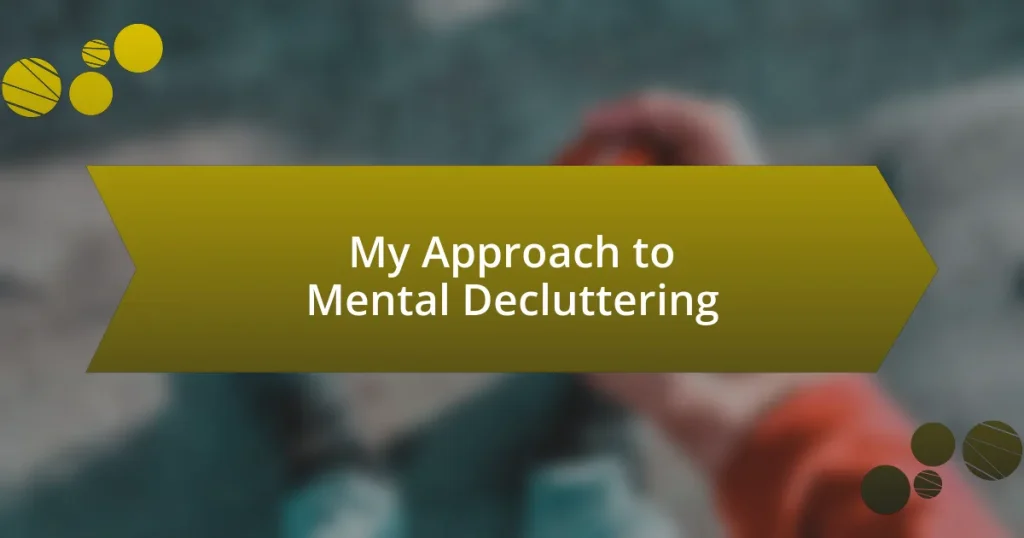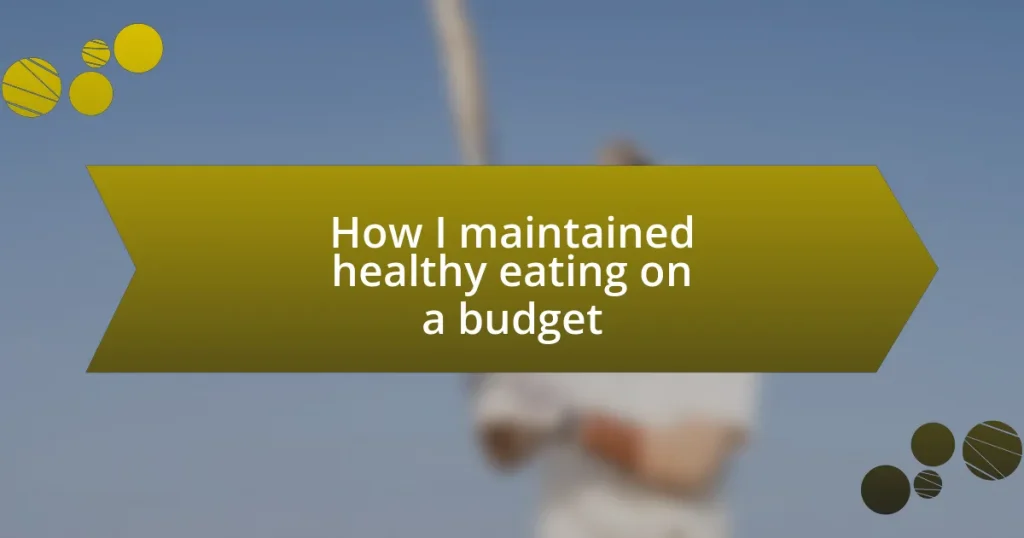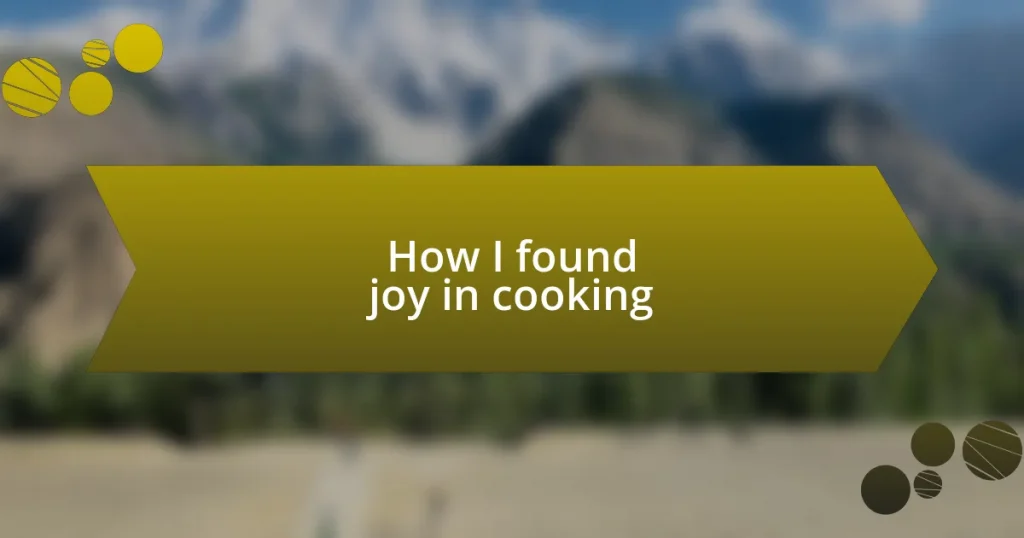Key takeaways:
- Mental decluttering is essential for achieving clarity, focus, and emotional resilience by identifying and prioritizing thoughts.
- Techniques like journaling, mind mapping, and digital detox can effectively aid in mental decluttering, promoting a clearer mindset.
- Regular routines and evaluations help maintain mental clarity, allowing for reflection on thoughts and noticeable patterns in emotional well-being.
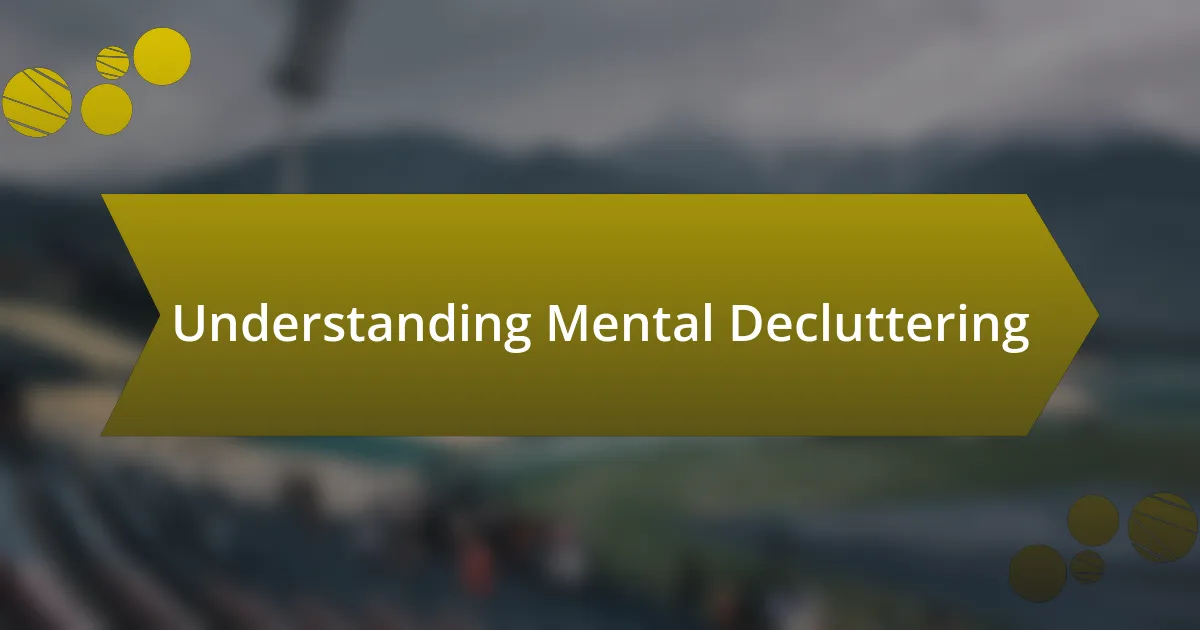
Understanding Mental Decluttering
Mental decluttering is about clearing the mind of unnecessary thoughts and distractions, allowing us to focus on what truly matters. I remember a point in my life when my head felt like a crowded room—everyone was talking, and I couldn’t hear myself think. Have you ever felt that way? It’s unsettling, isn’t it?
At its core, mental decluttering involves becoming aware of our thoughts and prioritizing them. I’ve found that journaling helps me sift through my mind. When I write down my worries, it’s almost like labeling boxes in a messy garage; suddenly, I know what I have and can decide what to keep and what to let go.
Think about the emotional weight we carry—it can be exhausting. Have you ever considered how many burdens you allow to occupy your mental space? Personally, I’ve learned that identifying those burdens is the first step toward lightening the load. It’s a gradual process, but each realization brings a breath of fresh air.

Benefits of Mental Decluttering
Mental decluttering has a profound impact on our overall well-being. I vividly recall the time I took a weekend to disconnect from my phone and to-do lists. It was surprising how clarity emerged from that space; my mind felt lighter, and I could genuinely engage in activities I loved without distraction. Have you ever experienced that sense of liberation when your mind is free from clutter?
Another significant benefit is improved focus and productivity. I noticed that when I organized my thoughts, my workflows became more efficient. It’s like when you clean your workspace; you can think and work better when there are fewer distractions. Prioritizing my mental space has allowed me to complete tasks more effectively and with greater satisfaction.
Moreover, emotional resilience often increases through mental decluttering. For instance, after setting aside time for reflection, I discovered patterns in my worries that helped me develop coping strategies. This process made me realize that many anxieties were unfounded. In what ways have you noticed a shift in your mindset when you address your mental clutter? I often find that addressing mental noise opens doors to healthier coping mechanisms and improved mental health.
| Benefit | Description |
|---|---|
| Clarity of Thought | A clearer mind enhances decision-making and creativity. |
| Increased Productivity | Fewer distractions lead to more focused and efficient work. |
| Emotional Resilience | Improving mental clarity helps develop stronger coping strategies. |

Techniques for Mental Decluttering
Techniques for Mental Decluttering
One effective technique I’ve found for mental decluttering is journaling. I remember a time when my thoughts felt like a tangled mess, and I decided to put pen to paper for just ten minutes a day. It was incredible how those simple reflections transformed my mental landscape, allowing me to identify what truly mattered and what I could let go of. Additionally, setting boundaries can be a game changer. By saying “no” to unnecessary commitments, I’ve carved out more mental space to focus on priorities.
Here are some techniques you can try for mental decluttering:
- Mind Mapping: Visualizing your thoughts can help organize and clarify your ideas. It’s like creating a roadmap for your brain.
- Digital Detox: Unplugging from devices for a few hours can significantly reduce mental noise.
- Meditation and Mindfulness: Spending just a few minutes each day in silence has helped me attune to my thoughts and emotions.
- Nature Breaks: I often find that a walk outside resets my mind; nature has a magical way of soothing the chaos.
- Decluttering Physical Space: I noticed that when I tidy up my surroundings, there seems to be a corresponding lightness in my mental space too.

Creating a Decluttering Routine
Creating a decluttering routine is essential for maintaining a clear mind. I set aside specific times each week dedicated to this process, which makes a significant difference. For instance, every Sunday morning, I reflect on my week, jotting down thoughts and tasks that need addressing. This regular practice ensures I start the new week with a fresh mental slate.
I also use a checklist to streamline my routine. Breaking down tasks into smaller steps keeps me from feeling overwhelmed. I remember when I first started, I would get lost in a sea of thoughts and emotions. But with a simple checklist, I can focus on one task at a time, which reduces that sense of chaos. Have you tried this approach?
Lastly, incorporating periodic reviews of my routine has been invaluable. Regularly assessing what’s working and what’s not allows me to adapt my methods. I once realized that my Sunday sessions were becoming stale, so I switched them to evening walks, integrating nature’s calming effects. This adjustment reinvigorated my decluttering process, underscoring the importance of flexibility in my approach.
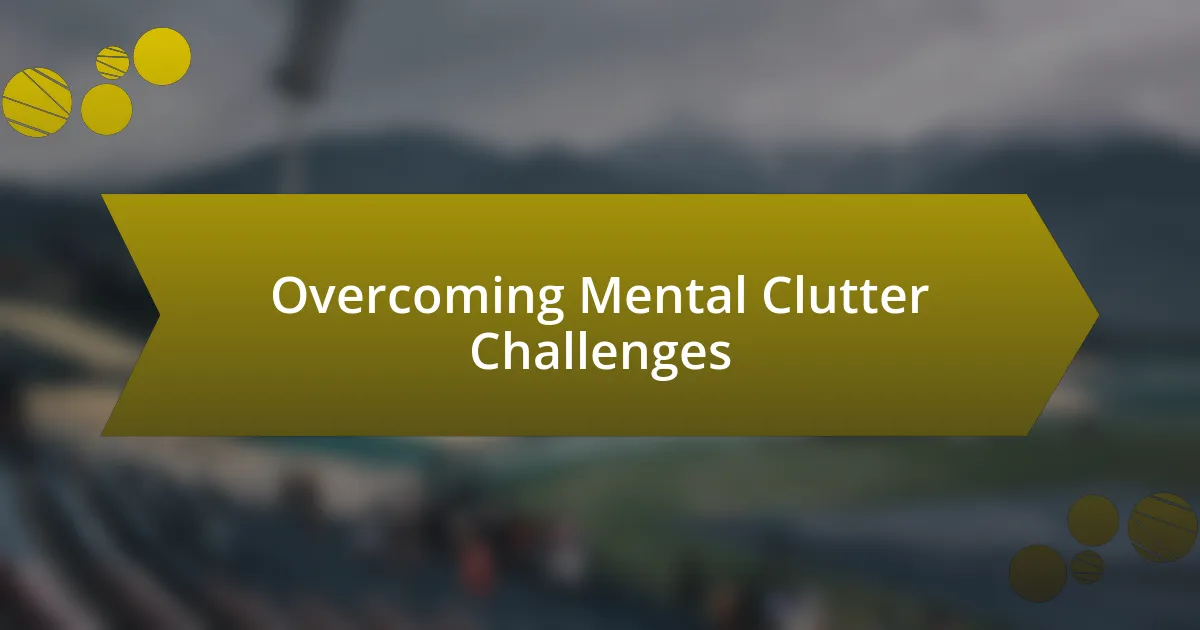
Overcoming Mental Clutter Challenges
Mental clutter often arises from the overwhelming demands of daily life. I remember a time when juggling work, family, and personal commitments left my mind feeling like a tangled ball of yarn. During those moments, I realized that taking five minutes to pause and breathe could significantly ease the chaos. Have you ever tried just stopping everything for a moment? It’s surprising how a single breath can bring clarity.
One challenge I faced was recognizing the difference between mental clutter and regular stress. I often attributed my feelings of overwhelm to a busy schedule without realizing I was holding onto unnecessary thoughts. Developing the habit of journaling helped me sift through my feelings, allowing me to categorize what truly mattered versus what was just noise. Isn’t it fascinating how writing can reveal the patterns clogging our minds?
Additionally, I discovered that mindfulness techniques can be incredibly powerful in confronting mental clutter. Initially, I was skeptical about meditation, thinking it would be too challenging. Yet, starting with just a few minutes each morning transformed my outlook, making me more aware of my thoughts and how they impacted my emotions. What if just a few quiet moments could shift your entire day? The effectiveness of mindfulness in managing mental clutter is becoming clearer with every passing day.
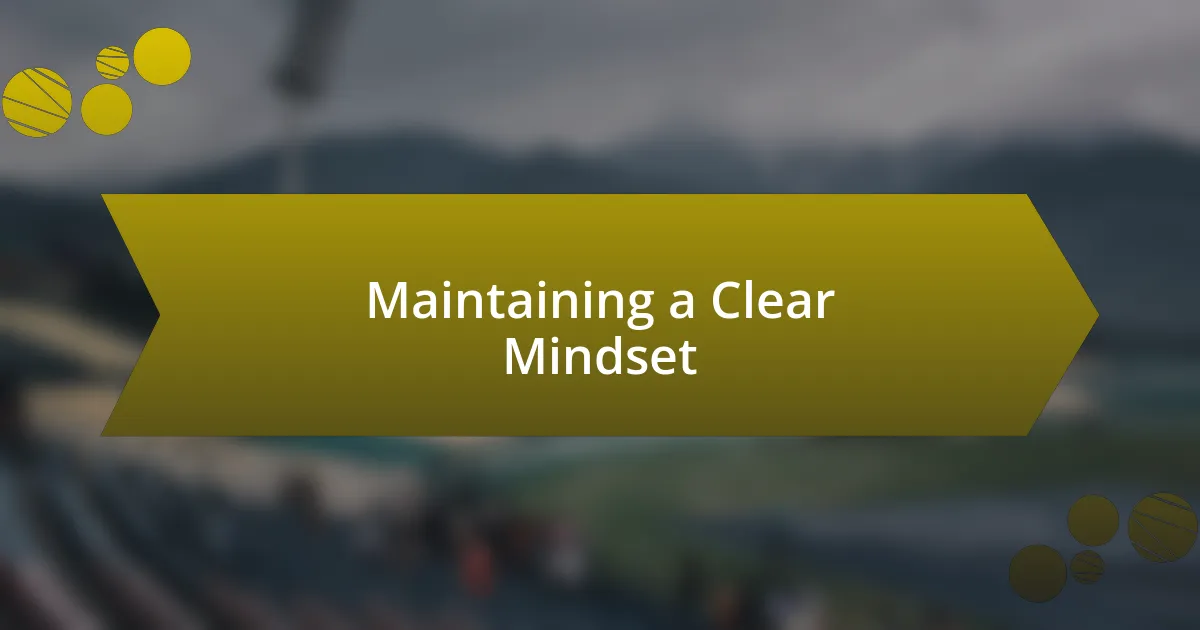
Maintaining a Clear Mindset
Maintaining a clear mindset often requires intentional practices. For me, starting my day with a short ritual—sipping my coffee in silence—sets the tone. It’s during these quiet moments that I reflect on my intentions, which helps filter out the noise that can build up throughout the day. Have you ever noticed how a simple routine can ground you before the storm of daily tasks?
I’ve found that surrounding myself with positive influences also plays a crucial role. Once, I decided to unfollow negative news and toxic social media accounts, and the change was almost immediate. It’s remarkable how much lighter my mind felt; I could finally focus on the things that inspire me. Are your surroundings nurturing your mental clarity, or are they adding to your clutter?
Finally, I’ve learned the importance of decluttering my digital life. Digital organization has become a priority for me; I set aside time each week to organize files and emails. It’s fascinating how the mess on a computer can mirror the chaos in your mind. Have you ever taken a moment to clean up your digital space? You might be surprised by the clarity that follows.
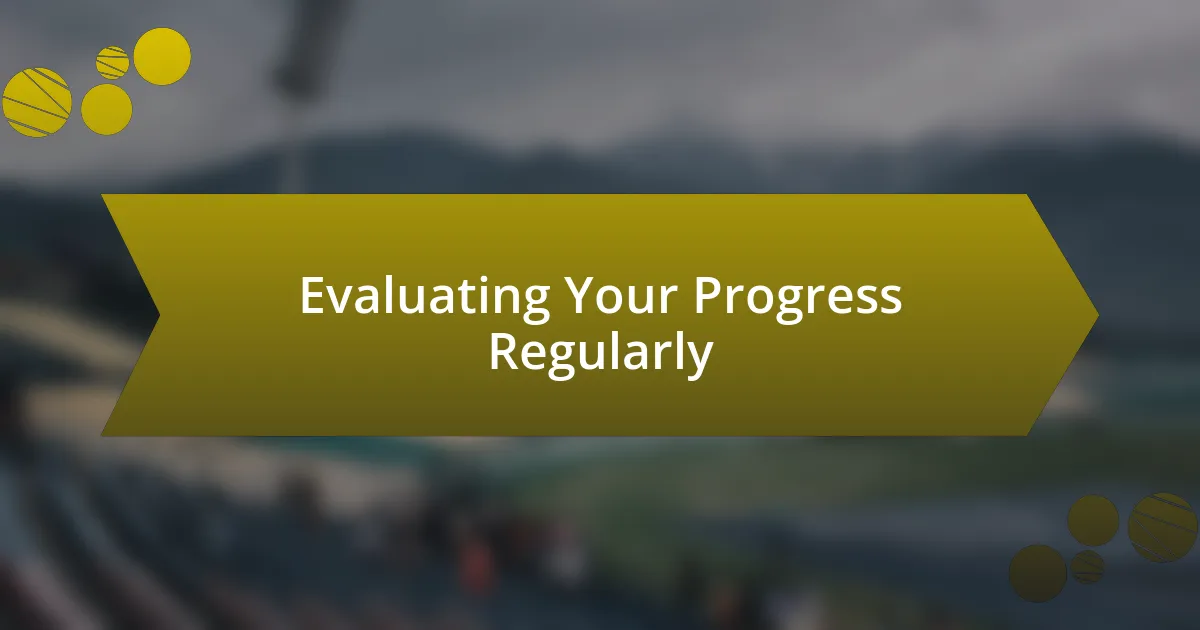
Evaluating Your Progress Regularly
Tracking your progress in mental decluttering is essential for ensuring you stay on the right path. Personally, I set aside time every month to review my mental and emotional state. This ritual has become a true barometer for me—when I sit down with a journal, it’s fascinating to see patterns emerge. Have you ever taken a hard look at your thoughts and noticed how certain feelings linger longer than others?
During these evaluations, I often ask myself where I feel lighter and where I feel weighed down. Just last month, I realized I was still holding onto some old grudges. The moment I acknowledged that, it was as if a weight was lifted off my shoulders. How many of us cling to emotional clutter without even realizing it until we stop to reflect?
Regular evaluation has also allowed me to celebrate small victories. I remember when I first decluttered my physical space and found it easier to think clearly. Each small win motivates me to keep going. What little triumphs have you experienced on your mental decluttering journey that deserve recognition? It’s these moments that remind us that every step counts.










